#les mis language
Text
Today I'm thinking way too much about how to translate "permets-tu?" into English.
The verb "permettre" does literally mean "to permit/allow" but "Do you permit it?" has always felt way too formal to me, given the original French. First of all, the original phrase doesn't specify an "it" or a "me" (Le permets-tu? / Me permets-tu?). It's very short, very casual, very ambiguous.
Some alternative translations might be:
"May I?" "Do you mind?" "If you'll allow?" "Is it alright with you?"
I think if I were to translate the chapter now I might go with "May I?" which keeps the casual, short, and ambiguous nature.
Also, Grantaire uses a lot of casual/ambiguous language in this chapter (maybe always? But I haven't been paying enough attention.) He says "Vive la République! J'en suis." (translated as "Long live the Republic! I'm one of them.") "J'en suis" is also a very ambiguous phrase. It's basically "I am of [something]" and the something is left unspecified. I would love for others to weigh in on this but I wasn't sure whether it could imply both "I'm a part of the Republic" and "I'm one of the insurgents." More modern translations of this phrase (on its own) would be "I'm in," or "I'm on board," but I don't know if that holds for the 19th century. (If something, such as a group of people, were specified beforehand it would still mean "I'm one of them / ...of which I am one / etc." in context) Any other French speakers with thoughts on these lines?
293 notes
·
View notes
Text
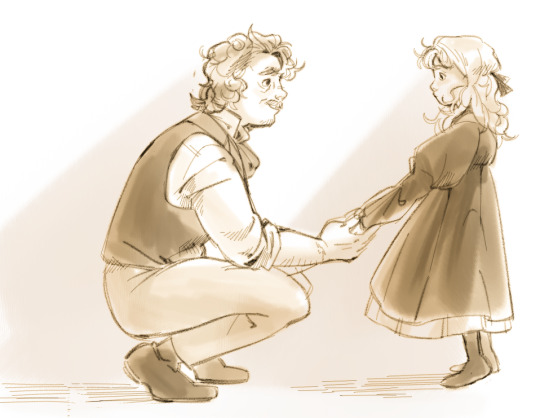

les mis can be a commedy. To me.
#[.art]#the last few chapters have been a riot. And by that I mean the implications are terribly interesting but it is also a bit funny.#anyways this book is a joy to read and doing so by a chapter daily is making it a lot more liveable than it would otherwise be#this way I'm also not restricting my french literature to Dumas and Baudelaire and a Camus and a few others#jean valjean#cosette#javert#and the gardener whose name I cannot spell nor pronounce and who will therefore be called The Gardener#you'd think that being right next to france and all I would pronounce it well but that's how latin languages get you.#les mis#I'm as always so sorry for maintagging it. Curses upon me etc etc being percieved. You know
262 notes
·
View notes
Text
nothing feels greater than showing someone you love something you love and watching them love it too
#quotes#happy#textposts#based off me showing my dad tick tick boom#tick tick boom#also with my friend and les mis#les mis#my friend and the marauders#marauders#wolfstar#good omens and literally anyone#my love language is forcing people to read/watch my hyperfixations#good omens#julie and the phantoms#butterfly soup#hamilton#stranger things#movies#mamma mia#little women#greta gerwig#percy jackson#taylor swift#tragic gay men#pitch perfect#specifically the finals in the first movie#that performance was a fucking masterpiece#my friends and family are all so sick of me
98 notes
·
View notes
Text
The ‘bon ami’ quote: Montparnasse and Éponine
During the rue Plumet sequence in Les Misérables, we see Éponine employ a range of different tactics to try and get her father and the Patron-Minette to leave the property, initially attempting to again convince them that the house is not worth robbing before making her famous speech of defiance.
When it comes to Montparnasse in this scene, Éponine appears to appeal to him in a slightly more personal (and/or romantic) way than the other Patron-Minette rogues. She initially addresses him informally— “Comment ça va, Montparnasse”— and uses language throughout the chapter that indicates she shares a closer relationship with him than she does with the other members of this criminal gang, employing numerous terms of endearment such as “mon petit Montparnasse” throughout (I’ve written a separate post going into further detail on this so will not repeat myself here). In addition to this, she holds out and grabs his hand early on in the chapter: “Éponine prit la main de Montparnasse” and appeals to him specifically about not going in, saying he is a “good boy”.
All these phrases vaguely imply that these two characters are a little closer than the other figures present in the scene. However, there is one other telling phrase that I feel is of particular importance when it comes to examining the glimmers of dynamic between Montparnasse and Éponine:
“Mon bon ami Monsieur Montparnasse”
What makes this line so noteworthy? Well, because “bon ami” has numerous meanings… On one hand, and in a literal sense, it translates to ‘good friend’. However, ‘bon ami’ is also a common way one might refer to their partner or lover informally. In fact, we even see ‘bon ami’ used in other parts of the novel to explicitly refer to a lover in a tongue-and-cheek manner—specifically, ‘bonne amie’ is used when we are introduced to Babet's mistress!
So, again, here is another instance where Hugo makes an obvious allusion to the fact that Montparnasse and Éponine are likely sleeping together (the first indicator being in the “Némorin” line).
It is the “bon” in “bon ami” which is especially notable in this context. Normally, the phrase ‘mon ami’ was only really reserved for close friends— which is interesting enough anyway, as even under these circumstances it certainly indicates that Éponine perceives herself to be very close to Montparnasse. But, the added ‘mon bon ami’ indicates an even closer relationship than ‘mon ami’ does. While the term cannot be used as an indicator of any sort of formal relationship going on between Montparnasse and Éponine, it certainly is suggestive.
Why would Hugo bother using this ambiguous phrase here? Well, to me it appears to be a purposeful call-back to the couple’s rendezvous on the night of the failed Gorbeau ambush— where Montparnasse was “être Némorin” with Éponine. However, it should be noted that “mon bon ami” is a far more suggestive indication that these characters might’ve actually shared more of a ‘romantic’ relationship than the “Némorin” line does (which, in context, only really suggests that Montparnasse and Éponine slept together on the night of the Gorbeau ambush).
Additionally, in this particular moment I feel it is crucial for readers to acknowledge the semi-infrequent, potentially partially romantic dynamic that exists between these characters, as it makes things all the more crushing when we then see Montparnasse turn around and threaten Éponine’s life at the end of this scene—so perhaps that was also a motivating factor for the suggestive line to feature in this chapter.
Because of the phrase’s multiple meanings, there have been a myriad of different ways that ‘mon bon ami’ has been translated over time. I have compiled how these lines appear in every major English translation of Les Misérables below, excluding the A. F. Richard translation (1863), since it cut the rue Plumet scene. Sidenote, these below examples are really great indicators of just how different some of these translations are!:
"Mon petit Montparnasse," répondit Éponine très doucement, "il faut avoir confiance dans les gens. Je suis la fille de mon père peut-être." [...] "Mon bon ami monsieur Montparnasse", dit Éponine, "je vous en prie, vous qui êtes bon enfant, n'entrez pas!"
—In original French, 1862
"My darling Montparnasse," answered Éponine very gently, "we must have confidence in people. I am my father's daughter, perhaps." [...] "My good friend Monsieur Montparnasse," said Éponine, "I beg you, you who are a good boy, don't go in!"
—Wilbour trans., 1862
"My dear Montparnasse," Éponine replied very gently, "confidence ought to be placed in people, and I am my father's daughter, perhaps." [...] "My kind M. Montparnasse," Éponine said, "I ask you, who are a good fellow, not to go in."
—Wraxhall trans., 1862
"My little Montparnasse," responded Éponine very gently, "you must have confidence in people. I am the daughter of my father, perhaps." [...] My good friend, Mr. Montparnasse," said Éponine, "I entreat you, you are a good fellow, don’t enter."
—Hapgood trans., 1887
"Montparnasse, my love," said Éponine very sweetly, "you must learn to trust people. Aren't I my father's daughter?" [...] "Montparnasse, you're my friend," said Éponine, "you're a good lad. Don't go in!"
—Denny trans., 1976
"My darling Montparnasse," answered Éponine very gently, "we must have confidence in people. I am my father's daughter, perhaps." [...] "My good friend Monsieur Montparnasse," said Éponine, "I beg you, you're a good boy, don't go in!"
—Wilbour trans. revised by Lee Fahnestock and Norman MacAfee. 1987
"My dear Montparnasse," Éponine replied very sweetly, "you must learn to trust people. I am my father's daughter, after all." [...] "My very dear friend, Monsieur Montparnasse," said Éponine, "please, you're a good boy, don’t go in!"
—Rose trans., 2007
"My dear Montparnasse," Éponine replied very softly, "you should trust people. I'm my father's daughter, after all." [...] "My dear friend, Monsieur Montparnasse," said Éponine, "you're a decent lad, I beg you not to go in there."
—Donougher trans., 2013
#les mis letters#lm 4.8.4#montparnasse#eponine#eponine thenardier#les miserables#les mis#the brick#rue plumet#meta#quotes#némorin#personally I think that some of these English translations aren’t doing enough to emphasise the undertones to Éponine’s language here#(first post in a while lol— you know it was going to be about Montparnasse and Éponine)
62 notes
·
View notes
Text
Speedrun french
As a native italian speaker, let's see how fast I can learn french.
For now, I know 0 french, can't understand when they speak BUT I can kinda sorta maybe read some of it.
Tools at my disposal:
A french kids cartoon that I love and watched to death but in English dub
That's it. Maybe Les Mis but I don't own it in french and I struggle to understand it even in english.
I bet I can catch up to my friends who've taken french as a second language in school for 5 years (Who also only spoke english, german and dutch before) in about 2 months as someone who already speaks a latin language. Let's see if I can do it!
#les mis#french#language#language learning#learning french#learning languages#francais#polyglot#les grandes grandes vacances#the long long holiday#italian#speedrun
53 notes
·
View notes
Text
Speaking of liking Wilbour’s translation - I do not have Les Mis thoughts today (1.2.7), I only have favourite quotes.
He condemned society and sentenced it. He sentenced it to his hatred.
the word which the finger of God has nevertheless written upon the brown of every man: Hope!
a quick pallid flash which lit up his whole soul, and showed all around him, before and behind, in the glare of a hideous light, the fearful precipices and the sombre perspectives of his fate.
If a millet seed under a millstone had thoughts, doubtless it would think what Jean Valjean though.
All that had happened to him would appear absurd; all that surrounded him would appear impossible. He would say to himself: “it is a dream.” He would look at the jailer standing a few steps from him; the jailor would seem to be a phantom; all at once this phantom would give him a blow with a stick.
The image of Valjean physically holding up the balcony of the City Hall - the embodiment of governmental power - on his back is unquestionably symbolic.
17 notes
·
View notes
Text
In pursuit of a truer Les Misérables english translation, I motion that anglophones bring back some form of informal second-person singular address because the once-a-book mentions of calling someone "thou" are NOT cutting it
#for spice you understand#i'm aware that this might make the language even worse. however.#and also just clarity of translation for 'permets-tu' and other such lines#les misérables#les miserables#be the change you wish to see in the world call people thou like it's the 1500s#les mis
114 notes
·
View notes
Text
Ahhhhhh I finally got this awesome comic!!
This is a French Comic Illustrated by Gaston Niezab and published in 1947, Edition "Les Grandes Romans Illustrés".
Idk if it's correct to say 'comic' about it tbh bc it contains several pages that have nothing to do with Les Mis, it looks like a magazine or something and Idk what the correct word is for what I mean in English.
(I've read from various sources that it's rare so Idk if u can find it if u want it bc it was hard to find for me and it was a little expensive too.. but I always believe that if you search hard u will get what u want!)

It's an absolutely amazing comic and I have a lot to talk about but for now I'm just going to show you all the full color pages bc it's stunning.
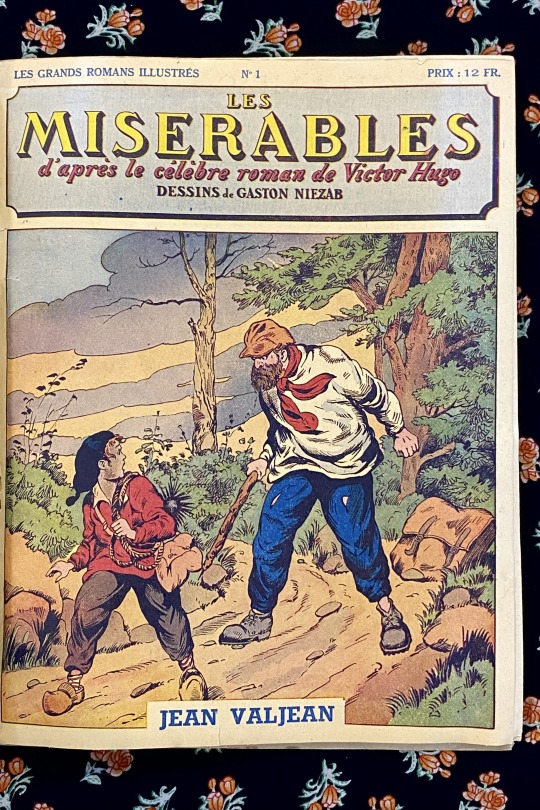

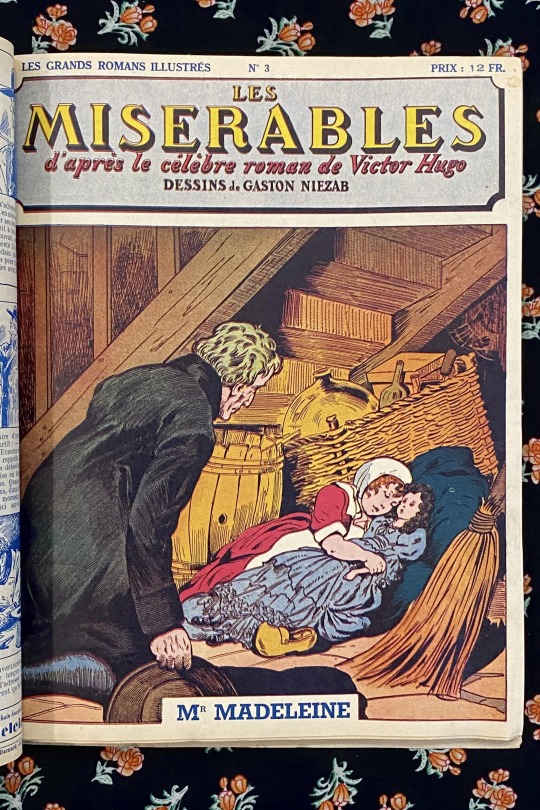


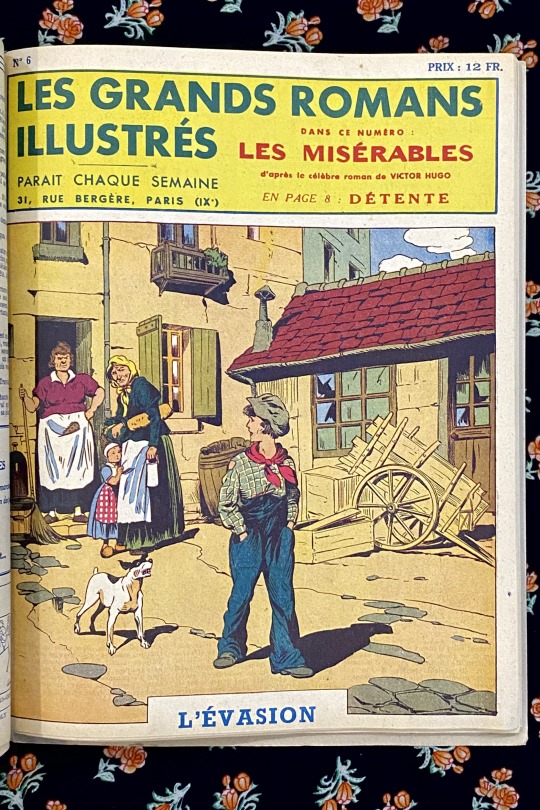
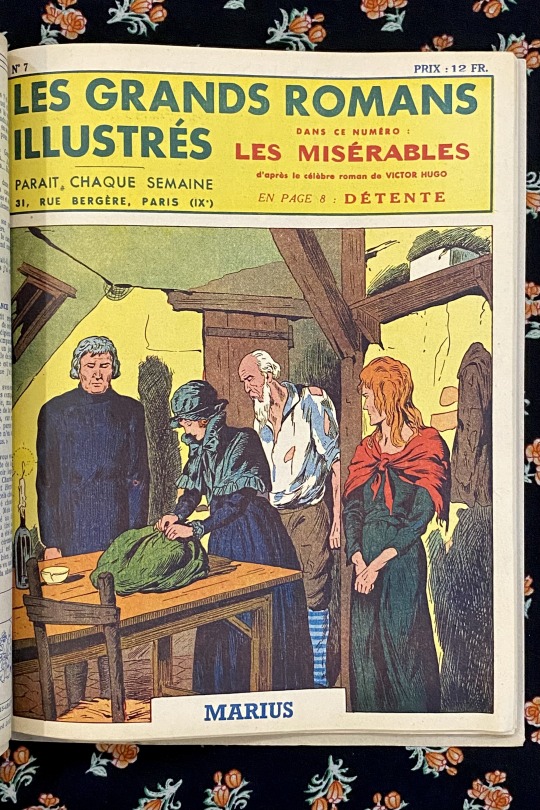


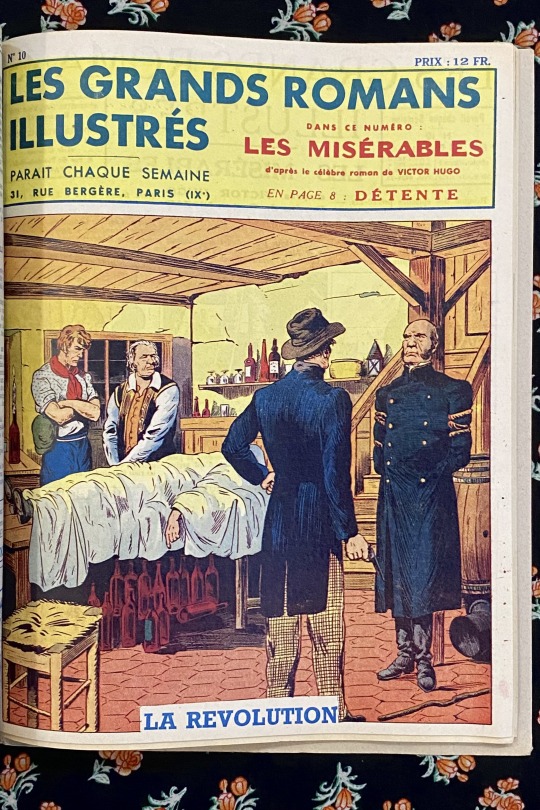
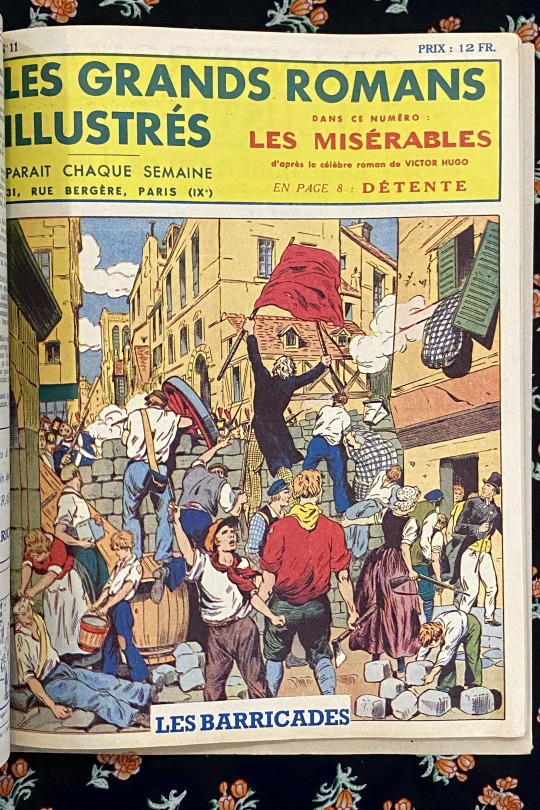
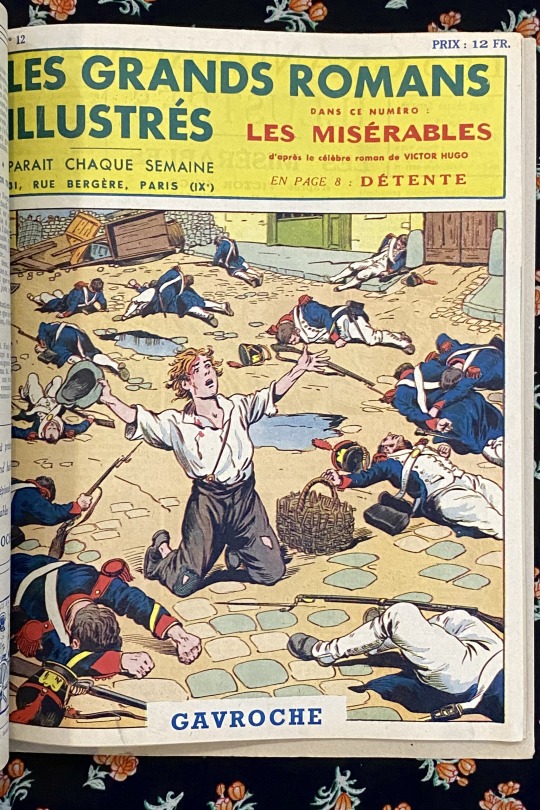
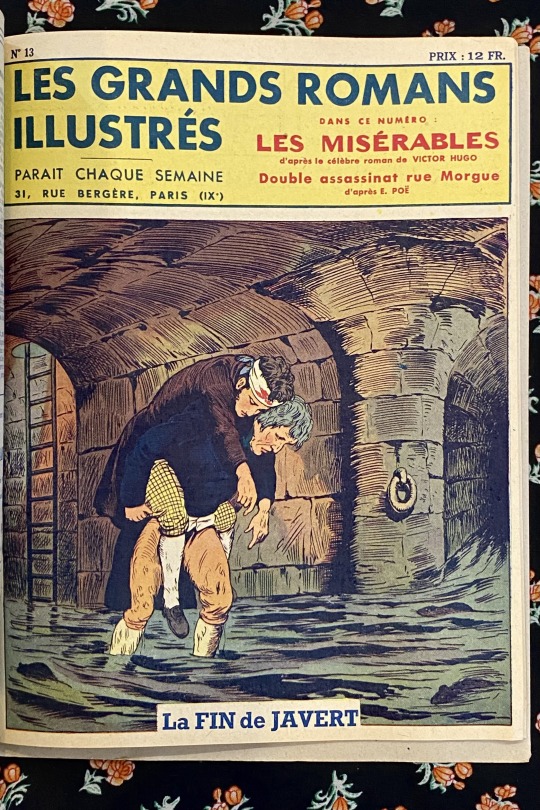
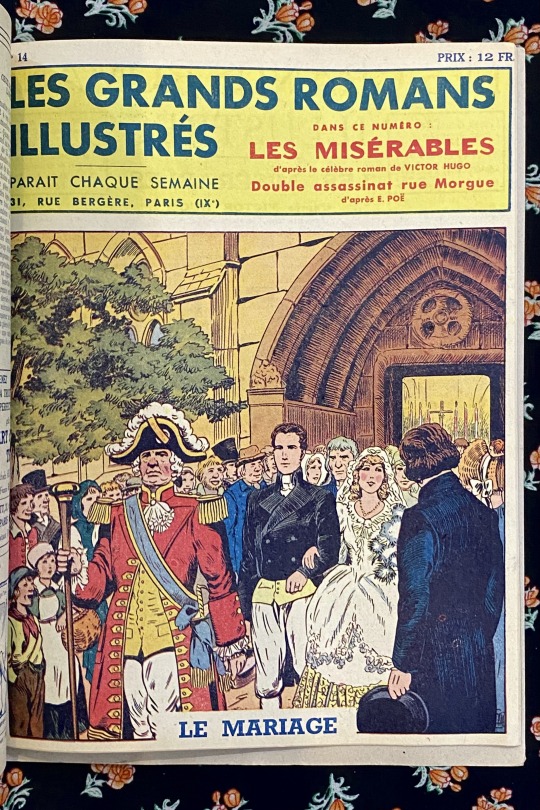
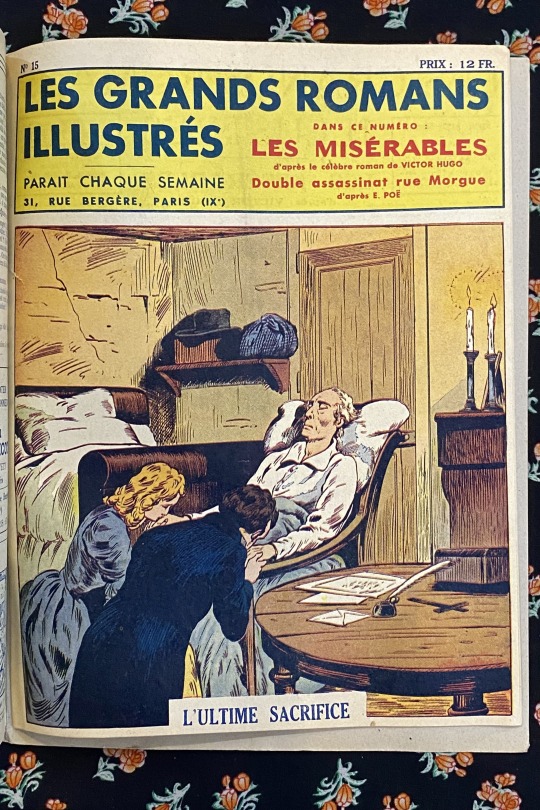
It also has funny short side stories for both Gavroche and Javert.

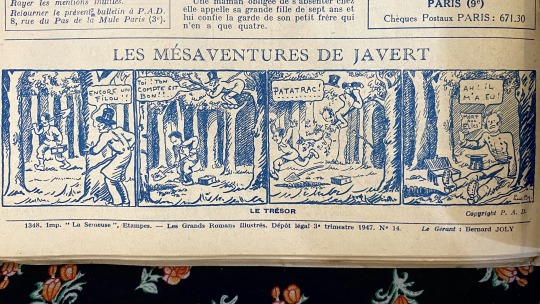
I appreciate the way the illustrator chose Javert out of all the characters to make fun of.
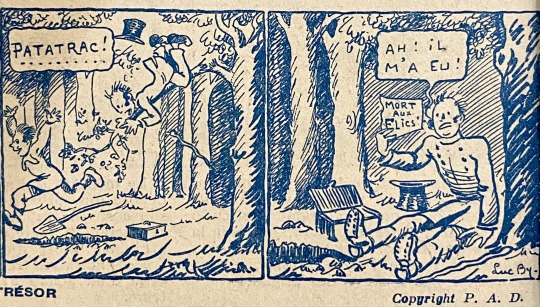
#les miserables#les mis#the versions i have#Niezab Comic#comics#my pics#This is the sixth French comic that I have when I know nothing about the French language except Bonjour..
49 notes
·
View notes
Text
imagine if victor hugo had known about the waterloo sugar factory theory.... imagine the metaphors he could have made...
#I've never read les mis so if he does touch on it then This Post Summarily Cancelled; Ignore Me; &c#but I'm fairly sure that that was after his time. So.#<- posting the vaguest of thoughts in excitement of finally laying hands on an academic paper on the subject that I a) can access#and b) is written in a language I know how to read and not GERMAN
9 notes
·
View notes
Text
#ophelia#hamlet#horatio#hamlet x horatio#Because that is what happened#flower language#Poor ophelia#eponine#eponine thenardier#les mis#les miserables#victor hugo#shakespeare#william shakespeare#willy shakes#shakesqueer#the bronte sisters#emily bronte#wuthering heights#Heathcliff#catherine earnshaw#edgar linton#marius pontmercy#cosette#erik the phantom#the phantom of the opera#phantom of the opera#In sleep he sang to me#erik x christine#christine x raoul
27 notes
·
View notes
Text
hi to the new people in the les mis fandom joining bc of joseph quinn, it is lovely to have u all with us and u are more than welcome, however u should know that bbc enjolras (and the whole bbc adaptation) is nowhere close to the original character and everything he represent.
while joseph quinn did a really good job at acting enjolras, the way the writers wrote his character was bad and out of character. obviously, and it's normal, an adaptation will always have its own interpretation of a character, and that's what's make fiction so great. but i think u need to be aware of the fact that it's not a good representation of what enjolras' character is and what his character has been representing for over 150 years (i could go into details and maybe will but it's late and i'm working early tomorrow).
i also wanted to say, as a reminder that, while it's completely fine to simp for enjolras (no one is immune to him, whether he's played by aaron tveit, joseph quinn or anyone else) and find him hot (because he IS hot or because he's played by joseph quinn, again, i get it; i don't find moustachjolras hot but damn that man is find irl), u need to be aware that enjolras is a queer character. it's stated multiple times that he has no interest in women, never has and never will. his character has been an important representation for the queer community, him being compared to a lot of gay historical figures (and i'm not going to start with the enjoltaire); but also for the aromantic and asexual community and trans community. his character is very likely to be aroace; and victor hugo describe him as being very androgynous looking, looking like a young woman. and while i don't want to talk on behalf of the trans community, i've seen a lot of post and fanfictions headcanoning him as trans, and i think it's very important to have that kind of representation in such an important piece of classical literature.
so please, be aware that the y/n fanfic and nswf y/n fanfic with female character x enjolras can be really disturbing, especially for people who have been in the fandom for a long time and are really looking up to his character and kinning him. don't just reduce him to hot-man-u-wanna-do-the-dirty-with when his character carries so much importance and has for decades. and i promise, caring about a character's whole essence and personality doesn't make them any less interesting or hot (quite the contrary actually).
also, let's not forget how we collectively hated on the casting choice when it first came out and i find it a bit odd to suddenly change our mind just bc it's the same actor who plays eddie munson. i personally think we were right to complain, bc it WAS a bad casting choice considering all the physical description of enjolras we had (and yes, in les mis, his physical appearance matters of lot).
we are not trying to gatekeep our fandom. on the contrary, i think it's really pretty fucking cool to have new people finding an interest in a 160yo book ! and for me, u guys are more than welcome to join our sad silly little fandom. but we just want u to be aware of all of this (and maybe some other issues that do not cross my mind rn) and be educated so we can all be drama free.
ok i'm done now, sorry for the long post, welcome again to the fandom, and if u decide to stay be ready for the tears and the pain caused by mr victor hugo ! bye bye, with love, a little french fan
#les mis#les miserables#enjolras#bbc les mis#bbc!enjolras#the brick#joseph quinn#stranger things#sorry if there are weird phrasing english isnt my native language#(yes im french)#(im standing up for my culture or smtg like that)
163 notes
·
View notes
Text
A fun pun from yesterday's Les Mis chapter:
Gavroche says: “And make haste, Monsieur What’s-your-name, for Mamselle Cosette is waiting.”
This line in French is: “Et dépêchez-vous, monsieur Chose, puisque mamselle Chosette attend.”
"Chose" means "thing" so Gavroche is kind of calling Jean Valjean "monsieur thingamajig" since he doesn't know Valjean's name. The funny part is that this can be made into a pun when he refers to Cosette as "Chosette" instead, which is just the word "chose" with a feminine "ette" tacked on, making them Monsieur Chose and Mamselle Chosette.
Rose attempts the translation of this pun more than Hapgood does, but neither express how well this works because of Cosette's name.
397 notes
·
View notes
Text
I just read this very long post here from a poll about which book is the most classic LOTR or Les Mis and like, you already know where I stand on that one lol. This isn't about the poll
but this raised me kind of an interesting question about Literature and information sharing
Cause one person was arguing that a classic is defined by impact and that's why they voted for LOTR (to me this is very funny it's like saying ghostbusters had a greater impact on film history than the lumière brothers, but I digress) and I'm just thinking about how since we're in an anglophone website a person (who speaks english as a second language) can understand the impact of LOTR but an english speaker might not be able at all to understand literature outside their sphere
I'm not trying call out that person at all btw! I'm just pondering about how the anglosphere monopolizes and controls information. Nothing comes in, everything comes out.
It's kinda whack
#most if not all of fandom online is anglo-focused and in english and also#not only that but it tampers down on other languages and cultures by flattening culture#idk idk I have a lot of thoughts#mostly les mis has inspired multiple brazilian soap operas and lotr hasn't so how much impact can that be
36 notes
·
View notes
Text
Bonjour!
My name Beanie and I am new here on langblr. This is a space for me to learn as well as track my French learning progress. I hope to share daily French journals as well as connect with other French learners!
And yes my name is a play on Jean Valjean from Les mis :)

8 notes
·
View notes
Text
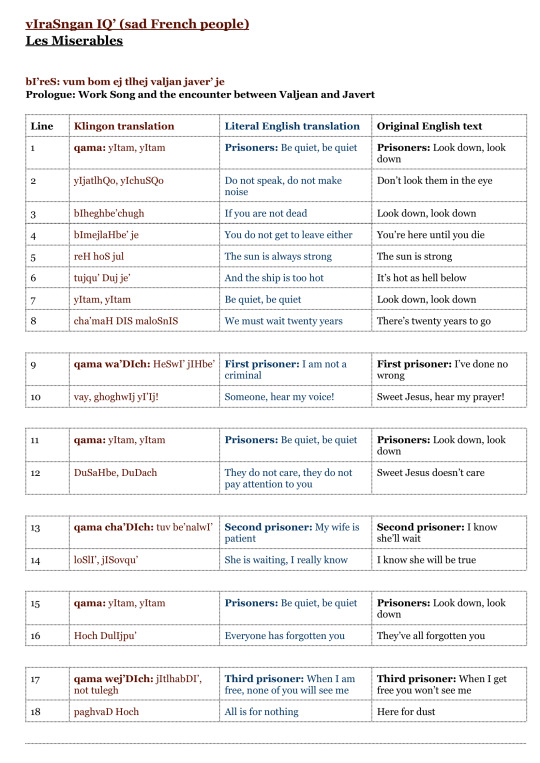

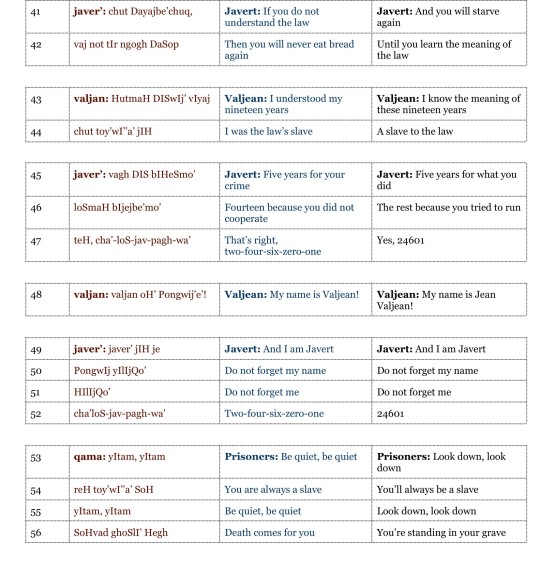
Freshly translated extract of vIraSngan IQ' (Sad French People)!
I'm so happy that this extract is done!!! I hope the translation is good :0
I had a hard time with some of the words, and I had to get a bit creative with the line "Look down" (and anything referencing looking somewhere), because I couldn't find a word in Klingon for to look, or to make eye contact with something/someone (on second thought, it might be the same word as to see, but it's done now so-)
Fun fact: Javert's Klingon name (or the Klingon transliteration of his name) is actually a double pun! "jav" means six in Klingon, which appears in Valjean's prisoner number 24601, and it is also a Klingon slang word meaning prisoner! (A bit ironic considering that Javert hates prisoners/criminals in general...)
Thank you so much @daily-klingon for your help, I couldn't have done it without you!
Also thank you to @psalm22-6 and @walrudel for the support :0
#tlhingan hol#klingon#klingon language#les mis#les miserables#jean valjean#javert#star trek#klingon les mis#klingon les mis extract
124 notes
·
View notes
Text
LOL a great Les Miserables scene I gotta share (pages 679-80 in my copy):
Courf & Bossuet are strolling down the street like bros do & Boss is like woah dood the snow looks like a zillion white butterflies… oh, hey! Isn’t that Marius?
It is, Courf says.
Heeeeeey, Maaaariiiiiuuuuuuhhs! Boss calls.
Shhhh! Courf goes. Can’t you see he’s following someone??
Who? Why?!
Just look at his face! He’s clearly in love!
Ohhhh! Who’s he following?
Hmmmm *Courf squints & looks around* Aha! *points* That…guy!
The only possible conclusion: 🌈🌈🌈🌈🌈🌈🌈🌈
#les mis#les miserables#hehehehe#courfeyrac#bossuet#les amis de l'abc#victor hugo#not verbatim :P#also keep in mind i’m reading this in french and it’s not my first language#but i think this is fairly accurate
8 notes
·
View notes